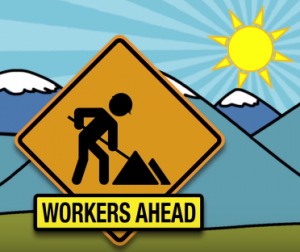
Image from Sun Safety at Work: Worker Version
When I was growing up in the 1970s, we didn’t hear a lot about the connection between sun and skin cancer. I remember slathering coconut-scented suntan oil onto my grandma’s back way before anyone ever talked about SPF.
Well, times have changed. Now we’re told to slap on sunscreen and spend more time in the shade. We’ve learned (as a general public) about the link between sun exposure and skin cancer.
Higher risk for outdoor workers
By 2015, there were 85,000 Canadians diagnosed with skin cancer. People who work outside are more likely to develop skin cancer. Their risk is 2.5 to 3.5 times higher than other people, says Sun Safety at Work Canada. These workers are also more likely to experience heat stress, which can develop into heat stroke that can damage the heart, kidneys, and liver. In extreme cases, it can be fatal.
Two new videos from WorkSafeBC offer best practices for working in sun and heat.
Sun Safety at Work: Employers — This video describes an employer’s responsibility to assess the risk for risk of sun exposure and heat stress in their workplace. And it talks about developing an exposure control plan that includes tents, shade structures, work-rest cycles, and scheduling the hardest tasks for the less-hot times of day (not between 11 a.m and 3 p.m.).
Sun Safety at Work: Workers — This video covers heat stress and its symptoms, which include extreme fatigue, dizziness, confusion, muscle cramps, nausea, and fast, shallow breathing. It also describes ways to manage sun and heat exposure, and more.
Despite what we may have learned (or didn’t learn) as kids, exposure to sun and heat can put us at risk, unless we take the right precautions. Check out more WorkSafeBC resources on sun & UV and heat stress.


